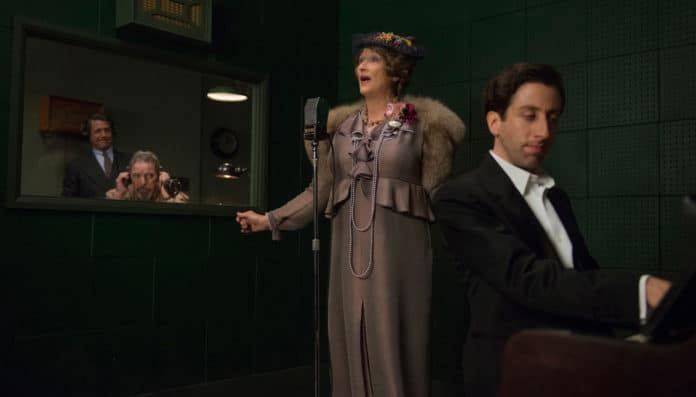‘Meryl Streep steps up to the plate with another cheerfully game performance in “Florence Foster Jenkins,” a warm, generous-hearted portrait of the title character: a wealthy music aficionado who, in real life, became a cult figure in the 1930s and 1940s with her earnest, wildly off-key singing.
“Florence Foster Jenkins” chronicles the final year of Jenkins’s life, opening with a tableau vivant at the New York arts club she founded and following the preparations for her infamous performance at Carnegie Hall in 1944 – a boisterous affair attended by rowdy sailors, camp followers, sundry gawkers and the likes of Cole Porter and Lily Pons.
Streep, who possesses a lovely singing voice, does a pitch-perfect imitation of a tone-deaf diva, donning copious padding and a slightly askew wig to play a dotty dilettante who, in the film’s telling, becomes a heroic avatar for sincerity and well-meaning amateurism who flourishes in spite of cruel, persnickety critics.
Music lovers – indeed anyone who admires discipline, virtuosity and intellectual self-awareness – may chafe at that aesthetic calculation. But even with that troubling question nipping at its heels, “Florence Foster Jenkins” manages to be tender and surprisingly affecting. Nowhere is that truer than in her curious relationship with her young manager and common-law husband St. Clair Bayfield, portrayed by Hugh Grant with his signature ingratiating charm and, ultimately, admirable steel. Part of the mystery of “Florence Foster Jenkins,” aside from her own obliviousness, is whether St. Clair is yet another user in Florence’s life, or whether his aims are true. (Viewers interested in a tougher view of Jenkins, especially regarding the nexus between privilege and blithe self-belief, should watch the French film “Marguerite,” a fictionalized version of her life that came out last year.)
“Florence Foster Jenkins,” which was written by Nicholas Martin, is a comedy, and a frothy, flossy one at that. But Martin rarely wins laughs at the title character’s expense: Most of the humor comes by way of Simon Helberg, as Florence’s alternately disbelieving and devoted accompanist, and Nina Arianda, as a tough-talking showgirl who leaves her first Jenkins recital in fits of uncontrollable laughter, but eventually becomes a fan.
Directed by Stephen Frears in a series of handsomely composed frames reminiscent of Woody Allen at his most ambered and gently affectionate, “Florence Foster Jenkins” brims with love for its characters and forbearance for even their most blinkered self-deception. Like Madame Jenkins herself, the filmmakers abhor sharp and pointed things, preferring soft edges and tact. (Their suggestion that her poor pitch might have been the result of her long-term syphilis is handled with typical discretion.) And, like her, they share the belief that music should be an act of spiritual connection rather than technical rigor or talent. Even when her notes are intolerably sour, Jenkins’s story is never less than touchingly bittersweet.
– –
Three stars. Rated PG-13. At area theaters. Contains brief suggestive material. 110 minutes.
– – –
Ratings Guide: Four stars masterpiece, three stars very good, two stars OK, one star poor, no stars waste of time.






